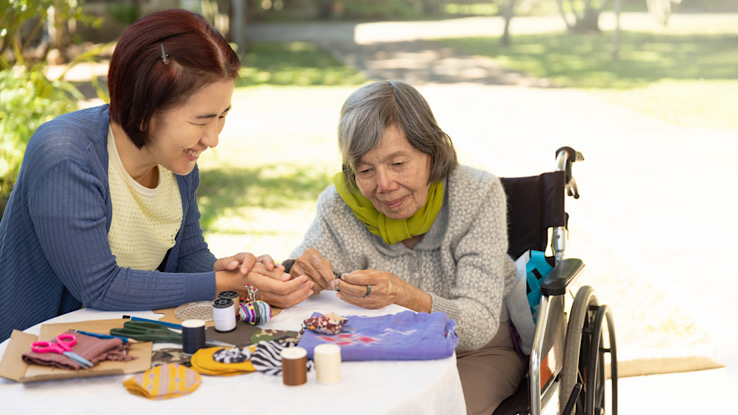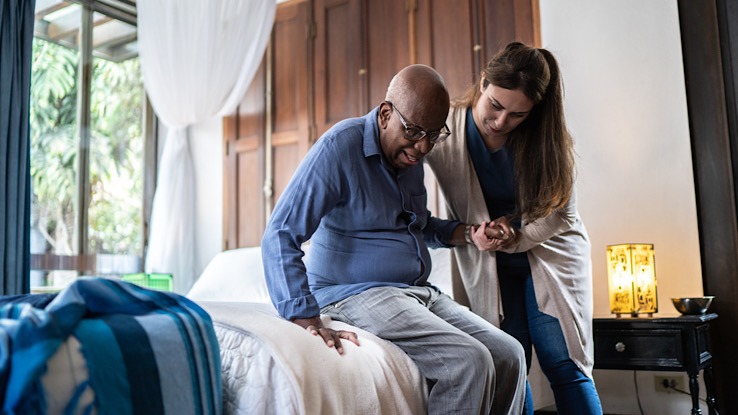How to Approach Aggressive Family About End of Life

Dementia is the loss of a person's ability to remember, think, and problem-solve. This can really affect how they alive each day. There are several unlike types of dementia. But the exact causes are unknown.
While dementia is more than mutual in older adults, and age is a central risk gene, dementia is not a normal part of crumbling. About 1 in every 3 people older than 85 have some course of dementia, but many people alive full lives without ever developing dementia.
Dementia gets worse over time and it differs for each person. This makes information technology difficult to know how long someone with dementia will live for. At this time, there are no widely available treatments to prevent, cure or slow the progression of dementia. This ways that many people must learn to live with dementia and make new plans for the hereafter.
If you're a caregiver, you are an important part of the intendance of someone with dementia. Find out how you tin can provide back up for someone with late-stage dementia.

As a person's dementia gets worse, they will need more than assist. They begin to experience many changes to their health and daily life over a menstruation of several months or years:
- Memory loss
- Having a hard time eating, drinking, and swallowing
- Having a difficult time doing personal intendance tasks such dressing themselves
- Finding information technology hard to talk to others considering they don't understand what is existence said
- Having a hard fourth dimension forming sentences to speak
- Moving less or needing help to walk
- Losing weight
Your Role as a Caregiver
Your role as a caregiver is to support the person with dementia. Your goal is to help maintain a high quality of life for them. It may start to become hard to communicate considering of memory loss and loss of speech. Effort finding other ways to connect through other senses: impact, audio, sight, gustatory modality and smell. This tin can include playing their favorite music, or brushing their hair. Think most the things they similar, and effort to include that throughout the twenty-four hours.
How to Support Determination Making
Equally someone experiences more memory loss, having hard discussions early on is important. The person with dementia may showtime making a plan with their family and doctors and then that they are as comfortable as possible at the finish of life. The word tin feel overwhelming, but it volition generally boil down to these three considerations:
- How the person would like to be cared for at the end of life (including accelerate medical decisions)
- Where the person would like to be at the end of life (for example, at home or in a facility)
- Who the person would like to be with at the end of life
This is known every bit advanced care planning and volition ordinarily require some legal documentation. It volition be helpful to get a lawyer to assistance brand an advance directive. An advance directive can also include:
- Deciding to decline a specific type of handling, like a ventilator
- Designating a person to make medical handling decisions after they're no longer able to make their own decisions
You can help support these decisions. Try to learn equally much as you can most your loved one's stop-of-life wishes, so you can help with conversations with doctors, family and friends if needed.
Cease-of-Life Care Options for Dementia

I of the main decisions is where the person will live and how they volition receive the care and support they need. Sometimes, additional support is needed exterior of the home to care for someone in late-phase dementia. This may mean moving the person to a facility then they can get the care they need. Options include:
- Aging in place: Virtually people prefer to proceed living at home as they get older. This is sometimes only possible for someone with early-stage dementia. Someone from a local home-based intendance assistance programme can provide their intendance. Or a family unit member tin act equally an breezy caregiver.
- Residential care facility: When a person needs a lot more help with their care, they may need to consider a residential intendance facility (like a nursing home) or specialist dementia care facility. This gives them 24-hour care from trained professionals.
- Palliative care: Towards the end of life, palliative care or hospice care are options.
You can larn more about long-term care options at LongTermCare.gov and find a range of suitable care providers at Medicare.gov.
Planning Ahead Financially
Decisions regarding how and where the person with dementia would like to be cared for will also require some financial planning. The costs of medical and long-term care can be expensive. You tin wait into options to back up their decision. In that location are many government programs available to assist cover healthcare costs. Every programme is dissimilar, so check the benefits and eligibility requirements.
Getting Support
The of import thing to recollect is that you are not alone. Y'all can find data about what to expect and how best to intendance for someone with tardily-stage dementia. Try these resources:
- National Found of Crumbling
- Alzheimer'south Association
- Eldercare Locator (detect local services in your area)
Caregiver Health
When you're caring for someone with late-stage dementia, you're probably non thinking almost your own health.. But caring for someone with late-stage dementia tin be overwhelming. Yous're taking on many responsibilities, so it's important to also accept care of your health as well.
Take time to:
- Encounter the doctor: Visit your doc regularly (at least one time a year). Be sure to talk about any changes to your stress levels, and any symptoms you are having.
- Exercise: There are and then many health benefits to do. Try to discover some fourth dimension each day, even with a busy schedule. Just ten minutes a day can help!
- Eat well: You are what you consume. Keep upwardly with a healthy diet. Yous may effort new recipes to modify things upwards a fleck.
- Get respite care: This is a way that you can arrange alternate intendance for your loved one for a few hours, days or weeks at a time. Respite care can happen in their home or at a healthcare facility. This can give your a much-needed break, or time to make more permanent arrangements.
- Bring together a support group : You may also benefit from finding a support group of people who are going through a like state of affairs.
Resource Links:
- "Alzheimer'due south Disease and Related Dementias" via National Institute on Aging
- "How to know when a person with dementia is nearing the stop of their life" via Alzheimer's Society
- "Finish-of-Life Treat People With Dementia" via National Institute on Crumbling
- "Dementia and stop of life planning" via NHS
- "Legal and Financial Planning for People with Dementia" via National Institute on Crumbling
- "Caregiver Health" via Alzheimer'southward Association
hernandezevervall.blogspot.com
Source: https://www.symptomfind.com/healthy-living/end-of-life-care-dementia-tips-for-caregivers?utm_content=params%3Ao%3D740013%26ad%3DdirN%26qo%3DserpIndex
0 Response to "How to Approach Aggressive Family About End of Life"
Post a Comment